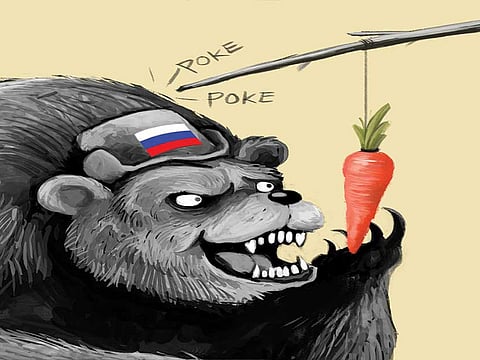Antagonising Russia is counter-productive
A Trump-Putin combo is still in the realm of fantasy, but it’s hard to envision that mutual cooperation could make things any worse than what they are now

For all its potential negatives in various areas, both domestic and foreign, a Donald Trump White House prepared to work with Russian President Vladimir Putin on conflict-resolutions has more chance of producing peaceful outcomes than the current dangerous face-off. Economic sanctions have failed to deter Russian belligerence. On the contrary, US and European Union’s (EU) punitive measures have only served to harden the Putin’s resolve to expand his nation’s spheres of influence not to mention his popularity at home.
A recent poll indicates his approval rating remains at a high of 82 per cent, way above United States President Barack Obama’s 57 per cent. It’s a given that when a population perceives it’s under attack from the outside, nationalist sentiment exponentially rises, domestic upheavals placed on the backburner.
Putin isn’t going anywhere for the foreseeable future, so it makes sense that working with him is a far better option than futile attempts to push him into a corner. Moreover, his response to Trump’s warm overtures proves that he’s keen to mend bridges with the superpower. Sticks haven’t succeeded, so there’s little to lose by attempting to bring Moscow on side with incentives.
International isolation failed to bring down the Fidel Castro regime or to dampen Cubans’ love for their late revolutionary leader. The same could be said for North Korea that, despite being thrust into an economic wilderness, evolved into a nuclear power threatening its neighbours and beyond.
Lessons should be drawn from the Ukraine fiasco too. If the EU hadn’t gone all out to lure Ukrainians with false hopes of lucrative deals and eventual EU membership on the back of purely geopolitical motives, the country would not have been teetering towards bankruptcy or been reliant on western largesse and Crimea would not be flying Russian flags.
Moreover, one can only speculate whether genuine cooperation between Russia and the United States to end the conflict in Syria, rather than turning the crisis into the proxy war it is today, could have ended the bloodshed several years ago. In that case, both sides viewed victory for themselves and the parties under their respective umbrellas as their ultimate goals when as permanent members of the United Nations Security Council bound by its charter, the preservation of life should have been their priority.
The pulling apart in different directions has achieved nothing except mass destruction, human misery, starvation and waves of desperate refugees. Vaulting ambition, muscle-flexing and determined one-upmanship on the part of Washington and Moscow have been a major contributing factors to the greatest humanitarian catastrophe of our time.
If Obama and Putin had found a way to climb onto the same page, chances are other players, such as Iran, Hezbollah and foreign fighters would have been kept out or dealt with appropriately, thus pulling the rug from under Syrian President Bashar Al Assad’s feet. He continues to rule on the premise that he needs to cleanse his country of terrorists before he would even contemplate resigning. Imagine if Obama and Putin could have established even a modicum of mutual trust, enough to speak with one voice on this point!
Obama’s Middle East legacy has been nothing short of shambolic. A once-stable Libya is an economic and security basket case now. Egypt was abandoned and had little choice but to tilt towards Russia. Iran has been legitimised and emboldened. Add to these the violence consuming Syria and Iraq and Obama’s premature Nobel Peace Prize looks like a tragic joke.
A Trump-Putin combo is still in the realm of fantasy, but it’s hard to envision that mutual cooperation could make things any worse than what they are now. There is a caveat to that analysis.
Trump, post-election, has shown a tendency to walk back on pledges made on the stump. He will not be pursuing a prison sentence for Democrat presidential candidate Hillary Clinton or deporting all illegal immigrants. His famous wall may be reduced to a fence in certain areas. And so there are no guarantees that as leader of the free world, Trump’s verbal embrace of his Russian counterpart will materialise. When Russia is deploying ballistic missiles to the Baltic region — causing shudders throughout the Baltic states — and on disputed islands in the Pacific, triggering Japanese ire, the rebuilding of trust between these feuding powers could be the panacea our troubled world needs so badly.
Linda S. Heard is a specialist writer on Middle East affairs. She can be contacted at lheard@gulfnews.com
Sign up for the Daily Briefing
Get the latest news and updates straight to your inbox



